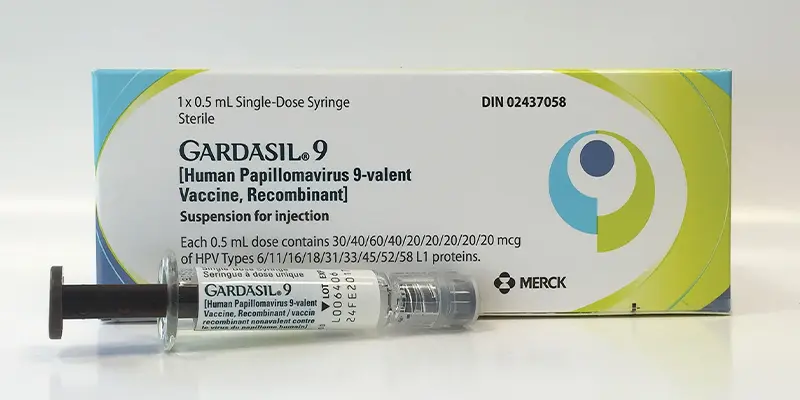HPV
The HPV vaccine is a safe and effective immunization that protects against infections caused by the human papillomavirus (HPV), a common virus linked to cervical cancer, other genital cancers, and certain head and neck cancers, as well as genital warts. The vaccine works by stimulating the body's immune system to recognize and fight the virus before an infection can occur.
It is recommended for preteens (ages 9–12) but can be given to adolescents and adults up to age 45, depending on individual risk factors. The vaccine is typically administered in a two- or three-dose series, depending on the recipient's age at the start of vaccination.
By preventing HPV-related diseases, the HPV vaccine plays a crucial role in reducing cancer rates and improving public health. It is endorsed by major health organizations, including the World Health Organization (WHO) and the Centers for Disease Control and Prevention (CDC).
Select Dose
Human papillomavirus (HPV) is a common sexually transmitted infection with over 200 strains, some of which can cause genital warts and cancers, including cervical, anal, and throat cancer. Most HPV infections are asymptomatic and clear on their own, but persistent high-risk strains can lead to serious health issues. The HPV vaccine effectively protects against the most dangerous strains, reducing the risk of HPV-related cancers and diseases. It is recommended for preteens (ages 9–12) but can be given up to age 45. Regular screening, such as Pap tests, is also crucial for early detection and prevention of HPV-related complications.
What is the HPV vaccine?
The HPV vaccine is an immunization that protects against human papillomavirus (HPV) infections, which can cause cervical, anal, and other cancers, as well as genital warts.
Who should get the HPV vaccine?
It is recommended for preteens (ages 9–14) for maximum effectiveness but can be given to individuals up to age 45.
How many doses of the HPV vaccine are needed?
Ages 9–14: Two doses, given 6–12 months apart
Ages 15–45: Three doses over six months
Is the HPV vaccine safe?
Yes, the vaccine has been extensively tested and is approved by major health organizations, including the CDC and WHO. It has a strong safety record with mild side effects like arm soreness, mild fever, or dizziness.
Does the HPV vaccine treat existing infections?
No, the vaccine prevents new infections but does not cure existing HPV infections.
Can adults get the HPV vaccine?
Yes, adults up to age 45 can get vaccinated, especially if they were not vaccinated earlier or may still be at risk for HPV exposure.
Do I still need Pap smears if I get the HPV vaccine?
Yes, regular Pap smears (for women) are essential for detecting cervical cancer, as the vaccine does not protect against all HPV types.
Can the HPV vaccine cause infertility?
No, there is no scientific evidence linking the HPV vaccine to infertility.
Does the HPV vaccine encourage sexual activity?
No, studies show that receiving the vaccine does not affect sexual behavior but significantly reduces the risk of HPV-related diseases.




